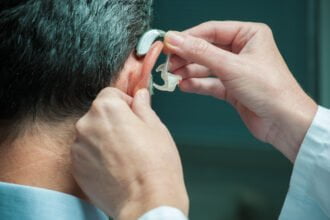Tinnitus is one of the most frustrating and complex medical conditions out there and it has sadly impacted millions of lives, always in the worst ways imaginable. Many victims of tinnitus have already resorted to various forms of therapy or taking supplements such as Tinnitus 911 to minimize the effects. If you or someone you know has tinnitus, you know just how dreadful it is and the negative ways it can influence you every single day.
- What Is Tinnitus?
- Vascular Issues
- Nerve Compression
- Muscle Tension and Stress
- Impact on Posture and Head Position
- What Are The Symptoms of Tinnitus?
- How Can You Be Diagnosed With Tinnitus?
- Medical History and Examination
- Hearing Tests
- Imaging Studies
- Other Tests To Determine If You Have Tinnitus
- Final Thoughts
According to USA Today, about 750 million people around the world suffer from tinnitus and it’s something that medical professionals are always trying to treat, or avoid. Denver headache and spine centers are continuously working to help patients minimize the effects of tinnitus through spinal adjustment and physical therapy.
What Is Tinnitus?
Tinnitus is commonly associated with someone’s ability, or inability, to hear and is usually a result of damage to the auditory system, such as damage to the inner ear or nerves. But did you know that some other factors related to spinal issues may contribute to tinnitus symptoms in certain cases?
Why is that? How can damage to the spine give someone tinnitus? One common belief is that disruptions in blood flow or nerve function related to spinal issues could potentially impact the auditory system and lead to Tinnitus. More research is needed to show definitive connections between spinal issues and Tinnitus but here are a few theories about how the two have become linked.
Vascular Issues
Spinal problems, particularly those affecting the neck region, might impact blood flow to the head and ears. Reduced blood flow to the inner ear could potentially lead to changes in hearing, including the perception of tinnitus. A lack of proper blood flow can directly impact auditory abilities and can cause sounds that seem a lot like tinnitus symptoms.
Nerve Compression
Conditions such as cervical spine stenosis or nerve compression in the neck might affect nerve signals traveling to and from the brain. Although the auditory nerve is not directly connected to the spine, alterations in nerve function could theoretically contribute to abnormal auditory perceptions.
Muscle Tension and Stress
Spinal issues can lead to muscle tension and stress, which might indirectly influence tinnitus as well. This is because increased tension in the neck and shoulder muscles could potentially affect blood flow and, as mentioned above, that will contribute to tinnitus.
Impact on Posture and Head Position
It goes without saying that spinal issues may influence posture and head position. Changes in head position can often affect the fluid dynamics within the inner ear, potentially contributing to tinnitus-like symptoms.
It’s crucial to note that these potential connections are still areas of ongoing research, and the relationship between spinal issues and tinnitus is not accepted by everyone involved within the medical community. That is because tinnitus is a very complex condition, and its causes can vary widely, including exposure to loud noise, age-related hearing loss, and certain medical conditions.
What Are The Symptoms of Tinnitus?
Regardless of the cause of tinnitus, there are many symptoms that you should look out for when you feel you are suffering from it. These symptoms vary from person to person and may come and go. One of the worst features of tinnitus is that it doesn’t often remain consistent for all sufferers.
Here are just some of the warning signs that you or someone you love might be experiencing tinnitus.
Perception of Sound
Individuals with tinnitus perceive sounds that are not present in their external environment. These sounds can be high-pitched, low-pitched, or have various tones. For some, tinnitus manifests like a slight buzz, while others hear something high-pitched and consistent. And others hear lower sounds and bass-like hums at all times.
Constant or Intermittent
Tinnitus can be a constant, steady noise or may come and go at different times. Because of this, some people aren’t entirely sure if they are suffering from tinnitus because it will be present one day and then gone the next day, leading them to think they aren’t having a problem.
Variety of Sounds
The sounds associated with tinnitus are diverse and can include ringing,
buzzing, humming, hissing, or even musical tones.
Impact on Hearing
Tinnitus is a subjective experience, meaning it can only be heard by the person experiencing it. But it isn’t caused by external stimuli, so others cannot hear the noise that someone perceives, making them feel more alone and isolated when they are battling the symptoms.
How Can You Be Diagnosed With Tinnitus?
If you feel that you may be suffering from tinnitus, there are many tests that your doctor or trained professionals can do to see if that is true. It’s the first step to combating tinnitus.
Medical History and Examination
A healthcare professional, often an ear, nose, and throat specialist, will take a detailed medical history to understand the nature and duration of tinnitus. Additionally, a physical examination may be conducted to check for underlying ear or health conditions.
Hearing Tests
Certain hearing tests help assess the individual’s hearing ability. Tinnitus is often associated with hearing loss, and hearing tests can provide information about the degree and type of hearing impairment.
Imaging Studies
In some cases, imaging studies such as an MRI may be conducted to rule out structural abnormalities, tumors, or other conditions that could be causing tinnitus.
Other Tests To Determine If You Have Tinnitus
These are not the only ways to find out if a patient has tinnitus. Here are just a few other avenues your medical team may pursue.
- Blood Tests
Blood tests may be performed to check for underlying medical conditions such as anemia, thyroid disorders, or diabetes.
- Tinnitus Matching
Tinnitus matching involves the patient indicating the pitch and intensity of their perceived tinnitus. This information can assist healthcare professionals in understanding the characteristics of tinnitus.
- Questionnaires and Self-Reporting
Patients may be asked to complete questionnaires or self-reporting tools to assess the impact of tinnitus on their daily life and well-being.
Final Thoughts
It’s important to note that tinnitus itself is not a disease but a symptom. Therefore, identifying and addressing the underlying cause, if possible, is a key aspect of managing tinnitus.
If you are suffering from tinnitus, because of spinal issues or another cause, there are options for you. Treatment approaches may include addressing contributing factors, using hearing aids for associated hearing loss, cognitive behavioral therapy, and sound therapy. If you are experiencing tinnitus, it’s always smart to consult closely with a healthcare professional for a thorough evaluation and appropriate management.










